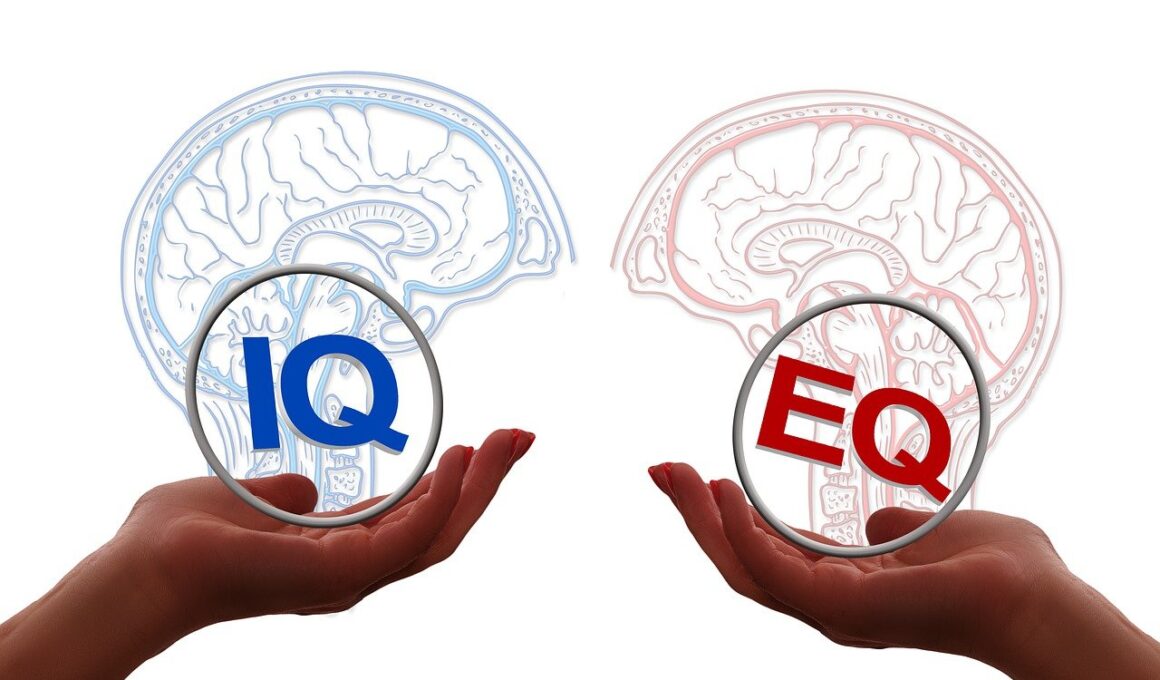The Impact of Emotional Intelligence on Sales Training
Emotional intelligence (EI) plays a crucial role in enhancing sales training effectiveness. Sales professionals equipped with high EI can recognize their emotions and those of others, leading to better communication. They can adapt their strategies based on the clients’ feelings and expectations, ultimately establishing stronger relationships. When sales personnel understand emotional cues, they respond more effectively to challenges during negotiations. Training programs that incorporate emotional intelligence strategies help sales teams become more resilient and adaptable. Cultivating EI within training enables teams to navigate difficult conversations with grace and poise. Therefore, enhancing EM aids in building trust, which is vital in sales success. A sales environment that prioritizes emotional awareness fosters collaboration, promotes teamwork, and enhances overall sales performance. Organizations should develop EI-focused training modules that include role-playing and real-life scenarios. Such methods will directly improve closing rates by facilitating genuine connections with customers. Moreover, employing assessments to measure EI before and after training can guide adjustments and improvements in methodologies. Hence, prioritizing emotional intelligence in training ultimately translates to better sales outcomes and client satisfaction.
High emotional intelligence not only boosts individual performance but also positively influences the team’s morale. When sales professionals exhibit empathy and emotional awareness, they contribute to a supportive atmosphere. This environment encourages open communication, enabling team members to share insights and strategies effectively. They become more willing to assist one another, ensuring everyone is on the same page. Training programs focusing on emotional development enhance this collaborative spirit. Additionally, EI training promotes self-regulation among sales staff in high-pressure situations. This self-regulation minimizes impulsive reactions, allowing individuals to make clear-headed decisions, particularly during challenging negotiations. With improved control over their emotions, sales representatives can stay focused on achieving objectives and maintaining customer relationships. This situation demonstrates the significance of integrating EI practices within traditional sales methodologies. Organizations that support this approach can expect an increase in employee retention rates, as sales professionals feel more valued and understood. Consequently, it becomes essential for business leaders to invest in emotional intelligence training and development, further encouraging a collective sense of achievement through shared goals.
Emotional Intelligence vs. Traditional Sales Techniques
Traditional sales techniques often emphasize hard skills and metrics, neglecting emotional components. However, emotional intelligence shifts the focus toward understanding clients’ emotions and motivations. High EI enables sales personnel to discern unspoken needs effectively, creating richer, more engaging interactions. Clients are more likely to respond positively to sales approaches that prioritize their emotional state. By incorporating empathy, sales representatives can tailor their approach based on customer feedback. This results in a significantly higher probability of closing sales. In addition, utilizing rapport-building strategies grounded in emotional cognition significantly outperforms traditional techniques. While conventional methods utilize data-centric approaches, EI makes the connection between individuals paramount. Training programs that combine both dimensions can leverage hard skills and emotional acuity simultaneously. This combination will encourage sales professionals to develop holistic strategies that resonate with their target audience. As a result, businesses can expect enhanced client loyalty and increased long-term sales, proving that integrated training approaches yield superior outcomes. Ultimately, however, the future of sales lies in the effective fusion of emotional intelligence with traditional sales techniques.
Measuring the success of emotional intelligence in sales training is essential to understanding its impact. Various assessment tools can effectively evaluate EI, providing insights into team dynamics and strengths. Emotional intelligence assessments help identify areas of improvement, guiding future training development. Organizations can also use this data to track progress over time. Evaluations can be structured around self-reflection and peer feedback, offering a 360-degree perspective. This feedback loop fosters an environment where continuous improvement is prioritized, leading to healthier and more productive sales teams. Additionally, organizations should measure traditional performance metrics alongside EI assessments. This comparative analysis provides a comprehensive overview of the training program’s effectiveness. Tracking key performance indicators such as closing rates and customer satisfaction ensures that emotional intelligence training truly enhances sales outcomes. Moreover, consistent follow-up sessions should be scheduled post-training to further assess long-term retention and application of learned EI strategies. Integration of these success measures solidifies the necessity of implementing emotional intelligence into company strategies, establishing a data-driven approach to personal and professional growth.
Role of Training Techniques
Training techniques significantly shape how emotional intelligence is absorbed and applied in sales contexts. Experiential learning methods, such as role-playing and simulations, are particularly effective in enhancing EI. These approaches allow sales professionals to practice responding to various emotional scenarios in a controlled environment. Moreover, case studies can help sales personnel analyze successful EI applications within real-world situations. Implementing feedback mechanisms encourages learning from both triumphs and failures, fostering greater resilience. Workshops that focus on active listening and effective communication also cultivate emotional awareness. Participants can engage in peer discussions, promoting shared learning experiences that strengthen team cohesion. Regularly recurring training programs ensure that emotional intelligence concepts remain fresh and relevant, reinforcing their application in daily sales activities. Online platforms can complement these training techniques, offering resources that allow for self-paced learning while tracking progress. Furthermore, incorporating mindfulness practices equips sales teams with the tools to manage stress in high-pressure situations. By embracing innovative training techniques designed for emotional intelligence, organizations can enhance both individual performance and team dynamics.
Incorporating emotional intelligence into sales training must align with organizational culture. A culture that values empathy, collaboration, and open communication directly supports EI initiatives. Leadership plays a vital role in modeling these behaviors, making it essential for upper management to set the tone. Training programs should reflect the organization’s core values, making emotional intelligence an intrinsic part of the sales process. Leaders should actively engage with team members, fostering a safe space for sharing experiences and learning collectively. Additionally, organizations can develop internal mentorship programs where seasoned sales professionals share their emotional intelligence success stories. Such initiatives encourage a culture of growth and learning and ensure that emotional intelligence principles are practiced consistently. Celebrating individual and team achievements based on emotional awareness also reinforces these ideals. Recognition validates the importance of EI in driving successful sales outcomes, motivating employees to embrace and cultivate emotional skills. Therefore, aligning emotional intelligence initiatives with the organization’s overall culture is imperative in creating a conducive environment for optimal sales training outcomes.
Conclusion: The Future of Sales Training
As the landscape of sales continues to evolve, emotional intelligence emerges as a vital component of successful training initiatives. Businesses that prioritize EI will foster more robust relationships with clients and employees alike. This new approach transcends traditional sales methods, emphasizing the human aspect of sales. In a world where consumers crave authentic connections, emotionally intelligent sales representatives resonate better with clients. Thus, investing in emotional intelligence training now guarantees long-term competitive advantages. Enhanced sales performances driven by EI will lead to increased customer loyalty and lasting brand reputation. To optimize these outcomes, organizations must commit to continuous training and development of EI skills within their teams. Embracing emerging technologies and methodologies will also keep training programs relevant to modern challenges. Moreover, combining emotional intelligence with advanced analytics shines a light on the personal experiences of customers, driving sales strategies. Ultimately, adapting to these changes positions businesses for success in an increasingly competitive marketplace. The future of sales training lies in recognizing and harnessing the powerful impact of emotional intelligence.
This is a compelling call for organizations to embrace emotional intelligence integration within their sales training initiatives. Addressing customer needs empathetically will redefine the landscape of sales. Building successful long-lasting relationships hinges on emotional awareness and adaptability. As such, business leaders and sales managers should take proactive steps to create training environments that foster emotional intelligence. In doing so, they will not only elevate sales performance but also cultivate a culture of authenticity and meaning. Therefore, the focus should be on enhancing emotional training to meet the demands of modern consumers. By recognizing the pivotal role of emotional intelligence, organizations can empower their sales teams to navigate the complexities of human interactions seamlessly. This is not just a fleeting trend but a necessity for future business viability. Prioritizing emotional intelligence will enable organizations to stand out in a crowded marketplace, ensuring that they thrive amidst challenges. In conclusion, focusing on emotional intelligence promises solutions that engender loyalty and customer satisfaction. Training in emotional intelligence can thus be viewed as an essential ingredient in the future of effective sales strategies.


